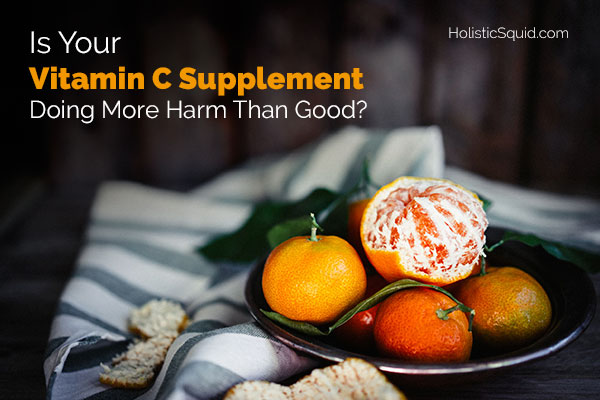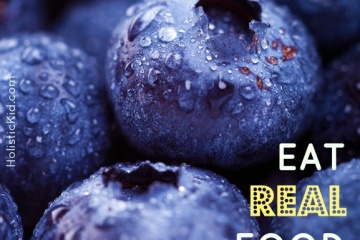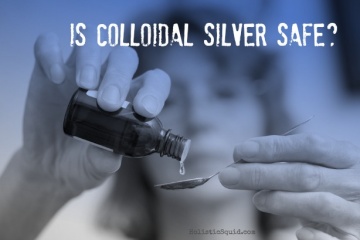

Vitamin C supplements get plenty of play for being a key to good health. This is because vitamin C reduces the sickies associated with the cold and flu. My own family takes it for immune support. But are all sources of vitamin C created equal?
The short answer is – NO. While the body absolutely needs vitamin C, where it comes from matters. Food vs. the lab? It probably won’t surprise you to learn that food is the safest source of vitamin C. What is surprising is who shouldn’t take high doses of synthetic vitamin C. Keep reading to find out.
Five things vitamin C does in the body
Whether from food or a supplement, have you ever wondered about all the hype around vitamin C – is it really as important as everyone says it is? Well, it is. And here are a few reasons why:
Vitamin C is an antioxidant.
This means that it protects the body against the noxious effects of stress.
Vitamin C helps out your immune system.
It's a nutrient that protects your immune cells while they fight off infection, making vitamin C pretty useful if you're battling a cold or the flu.
Vitamin C helps your body make collagen.
Collagen is the stuff of skin, joints, and connective tissue. And while collagen is wonderful to take as a supplement, you need a little vitamin C to make your own.
Vitamin C controls the production of cortisol.
Cortisol is a stress hormone that's stored in the adrenals. Vitamin C can minimize the release of cortisol – which partially explains why high doses of vitamin C lowers blood pressure.
Vitamin C promotes the absorption of iron. Specifically, non-heme iron or the kind of iron you find mostly in plants.
That said, it is possible to have too much of a good thing. While its toxicity it low, taking excessive amounts of synthetic vitamin C can stir up tummy troubles like diarrhea, nausea, and cramping.
Why you need Vitamin C every day
Vitamin C is the kind of nutrient that you must get from food or a supplement. This is because the human body doesn’t make it’s own vitamin C.
Funny, isn’t it? That nature would somehow forget to equip us with the ability to make vitamin C.
My guess is that historically – we’ve been able to get plenty of vitamin C from food. It’s abundant in plants and even some animal-sourced foods contain vitamin C. Some microbes also make vitamin C. But an overly processed diet that’s missing a rainbow or fruit and veggies means you’re getting very little natural vitamin C.
Plant foods that are high in vitamin C and that you’ll see in food-based vitamin C supplements that include berries like camu camu, acerola, and gooseberry. The high-fiber food baobab – which feeds good gut bacteria – is also an excellent source of vitamin C. Other plant foods that will give you a boost in vitamin C:
- Tropical fruits like guava, kiwi, papaya, and pineapple
- Citrus like lemon and orange
- Broccoli
- Persimmon
- Kale
You can find vitamin C in animal-sourced foods, especially when eaten raw. Liver is the best source of vitamin C. Followed by raw oysters and cod roe. Other animal sources of vitamin C include:
- Fried liver
- Roasted heart
- Stewed lamb tongue
For men, the RDA (recommended daily allowance) of vitamin C is 90 mg. Women should get at least 75 mg. For reference, the plants foods mentioned above contain between 200 and 40 mg of vitamin C for a 3.5-ounce serving. And few ounces of raw oysters give you around 30 mg of vitamin C.
So you eat oranges… isn't that enough?
Yes…
You absorb most of the vitamin C you eat – until you reach about 1 g or 1000 mg of vitamin C. At which point, absorption drops from 90% to 50%. If you eat plenty of raw fruit and green veggies, you're most likely meeting your requirements for vitamin C.
But…
What about those days that you don't eat a ton of fruit and vegetables? Or when need a little extra boost in vitamin C? In that case, you may want to supplement. Just keep in mind that in doses above 1000 mg, around half of the vitamin C is actually absorbed and the rest is eliminated through your urine.
Athletes shouldn’t take synthetic vitamin C
Synthetic vitamin C is – chemically – the same as natural vitamin C: ascorbic acid. What sets synthetic vitamin C apart from the natural stuff is how it's packaged.
For example, where does vitamin C go in the body? How is it used? This partially depends on whether it's a lonely compound of ascorbic acid or if it's surrounded by friends that also come from plants – like bioflavonoids. As it turns out, certain plant compounds may improve how well you use vitamin C .
That said, ascorbic acid is ascorbic acid. No matter where it comes from.
And when you take synthetic vitamin C, you see it's just as (if not more) absorbable than natural vitamin C. According to the Linus Pauling Institute,
A study in 68 male nonsmokers found that ascorbic acid consumed in cooked broccoli, orange juice, orange slices, and as synthetic ascorbic acid tablets are equally bioavailable, as measured by plasma ascorbic acid levels.
However, folks who do resistance training (otherwise known as strength training) should exercise a wee bit of caution when taking high doses of isolated antioxidants – like vitamin C. While antioxidants can minimize muscle damage and fatigue, it turns out your body requires a certain amount of stress to do its job. Some researchers have found that supplementing with vitamin C (1000 mg) can interfere with the signals between muscle cells…reducing physical endurance.
In short, in order to adapt and overcome the physical stress of training (which makes you stronger) your body requires stress signals – which high doses of vitamin C interfere with. A “high dose” is somewhere around 1000 mg of synthetic vitamin C a day.
What's more, it appears high levels of vitamin C are only beneficial for those who eat plenty of fruit and veggies that are filled with vitamin C – suggesting that isolated vitamin C is not enough and there's something to whole foods that support overall wellbeing.
Look out for GMOs
In plants, in animals, and in the lab – vitamin C is made from sugar or glucose. The problem with synthetic, lab-made vitamin C is that the sugar used is usually corn syrup.
That's right. Synthetic vitamin C comes from corn, which is often sourced from GMO corn. If you have an allergy or intolerance to corn, you may also want to opt for natural vitamin C from whole food sources.
When our immune system need some extra support, my family uses lypospheric vitamin C.
Lypospheric vitamin C uses sodium ascorbate. It's a “mineral salt” of ascorbic acid and therefore buffered, or less harsh on your tummy. And because sodium ascorbate is packaged in a little fatty sac made of phospholipids, it's transported directly into your bloodstream – bypassing absorption issues that arise when you take more than 1000 mg/day.
Adults can do 2000-4000mg of lypospheric vitamin C as needed per day, and kids range from 500-2000mg depending on age and size.
Click here to try my favorite vitamin C











Great Article, thank you for the information!
I think Andrew Saul, PhD… (Doctoryourself.com & That Vitamin Movie) would disagree with you
Thank you for this insightful post! 🙂
I will have to look for a good Vit C supplement as the one in your link contains citric acid and that’s a no-no for me because I am gluten intolerant.
Hey Sabrina!
While it’s true that wheat and other starchy foods like beets or corn are used to make citric acid, you don’t have to worry about gluten. This is because gluten is a protein and it’s removed long before it gets to the stage where the sugar in wheat is turned into ascorbic acid.
Hope this helps, thanks for the great comment!
Emily xoxo
Thank you very much. This article adds to my knowledge and very helpful!
I am surprised there is no mention of Sodium Ascorbate (alkaline salt Vitamin C). This is generally tolerated easier on the stomach and less likely to cause anemia (from the acidity). I know that Dr. Levy and Dr. Susanne Humphries research might be controversial for some but they do offer interesting scientific theory (in relation to pertussis and other bacterial infection) that warrants this particular Vitamin C (sodium ascorbate) supplement. Would love your thoughts…
Hey Sara,
If you read the last section of the blog (under “Look out for GMOs”) there is mention of sodium ascorbate, since it’s the form of vitamin C used in LivOn Labs’ lypospheric vitamin C 😉
All the best!
Emily xoxo
Hi Emily, love love love your blog and recommendations. I purchased the LivOn Vit C and a few other of your suggested products. Would you be able to suggest a LivOn dose for a 37 lb 3 year old? Haven’t been able to find a recommendation anywhere—! Thanks so much, Elisa
Hey Elisa,
The standard recommendation for a 3 year old is 15 mg of vitamin C a day. For larger doses with lipospheric C, you may want to do a quarter of a packet. For little ones, I generally prefer a whole food source of vitamin C with its accompanying bioflavonoids – vitamin C helps with the absorption of non heme iron and it can be a great source of antioxidants.
Thanks for the great question!
Emily xoxo